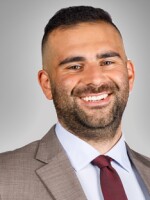HANOVER TWP., Pa. — They took the stage and spoke candidly of their struggles. They shared stories of progress and victories with their own mental health. Some fought back tears.
Twelve young people, ranging from middle school age to college students, participated Friday in a suicide prevention conference organized by Lehigh Valley Reilly Children's Hospital.
- Lehigh Valley Reilly Children's Hospital hosted 'Staying Alive,' a panel discussion for suicide prevention
- Speakers were young people from middle school to college
- Leading the discussion was Dr. Hatim Omar, chief of adolescent medicine at the children's hospital.
Though the discussion was put together by a health care company, the panelists did not always shy away from speaking critically about the mental health care system in the Lehigh Valley.
Kaitlyn Macauley, a student at Lehigh Carbon Community College, raised the issue of confidentiality when it comes to speaking with health care providers and psychological support services.
"It can be hard," Macauley said. "Teachers are mandated reporters, and it can be hard to find someone you completely trust. Doctors, when you're under the age of 18, have to tell so much to parents. School counselors have to call home."
"I think also coming from a young adult, just responsibility that hits you very, very fast that you've never had to deal with before."Kaitlyn Macauley, student at Lehigh Carbon Community College
Other panelists chimed in to say they feel a lot of irrelevant or embarrassing things get back to their parents from professionals they speak with, which can damage their trust.
A mental health crisis
The two-day conference at the SureStay Plus Hotel at Routes 22 and 512 in Northampton County was called "Staying Alive." It was scheduled amid a national mental health crisis worsened by the COVID-19 pandemic — and hitting especially hard on young people.
Topics included disordered eating, social withdrawal and some even discussed bouts with emergency-level psychiatric situations.
Leading the discussion was Dr. Hatim Omar, the chief of adolescent medicine at Reilly Children's Hospital. Many on the panel had direct experience with him — and admiration. After the discussion, one approached Dr. Omar and thanked him for saving her life.
Young people spoke of specific hurdles and triumphs — several praising the benefits of equine therapy, which has a strong presence in the Lehigh Valley. But perhaps the most passionately discussed topic was the fork-in-the-road nature of being a young adult in 2023. Panelists described feeling stuck between youth and adulthood, and feeling a heavy weight of responsibility.
"I think also coming from a young adult, just responsibility that hits you very, very fast that you've never had to deal with before," Macauley said. "Looking at the future, learning through school, about the environment. I think our generation is expected to solve those issues one day, and hopefully sooner rather than later."
A doctor's calling
Omar began conducting mental health panels with young adults in 1999, in Kentucky.
Speaking with reporters after Friday's panel discussion, one asked how the landscape for young people has changed since then. The reporter alluded to social media, as if already half-knowing what kind of answer it would evoke. Omar delivered an unexpected response.
"The average kids when I asked them, 'When was the last time you had a family meal?' They have no idea what I'm talking about. They don't get together, family doesn't do anything together."Dr. Hatim Omar, chief of adolescent medicine at Lehigh Valley Reilly Children's Hospital
"I can show you quotes from 5,000 years ago, that people then thought that their kids are having too much sex," Omar said with a laugh. "Things never changed. Teenagers, developmentally, biologically, are the same. What changes is the environment — the society around them."
However, Omar referenced statistics by the Centers for Disease Control and Prevention (CDC), showing an alarming rise in suicide risk over the last half-century, especially among teenage girls.
Suicide is the second-leading cause of death for people ages 10 to 24, according to the CDC.

Omar attributes some of the increases to changes in the way young people interact with each other (through the internet) as well as changes in the family structure.
"The average kids when I asked them, 'When was the last time you had a family meal?' They have no idea what I'm talking about," Omar said. "They don't get together, family doesn't do anything together. I mean, they come to the clinic, and the mom is on the phone instead of listening to what we have to say about their kids."
Changing lives
Omar's path to his career is a harrowing one. He grew up in Palestinian territory during the earlier years of the Israeli-Palestinian conflict.
"I witnessed young people getting killed every day, practically for target practice," he said. Growing up in wartime, he lived in a small room with 10 other people.
He eventually left, living in a few places, working odd jobs, such as a cab driver, and at one point, a shoe salesman. Then, he was admitted to medical school in communist Bulgaria.
"It was a great medical school, but you also see what a lack of freedom does," he said.
Working as a physician, then obstetrician, then gynecologist, he eventually had a realization.
"At some point, I realized that the most effective thing I can do is change a young person's life," he said.
At the podium Friday, Omar had a final tip for parents in the room. He said children are often deprived of hugs, and he urged all the parents listening to make sure to hug their children often, in a casual, meaningful way — not as a formality.
"They want to have physical contact and hugs," he said, raising his finger to emphasize the point, with a slight smirk. "They just don't want them in public."
EDITOR'S NOTE: Crisis counselors are available 24/7 at the National Suicide Prevention Lifeline by dialing 988 or 800-273-8255; or by texting the word HOME to 741741.


